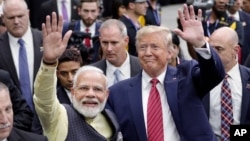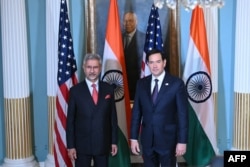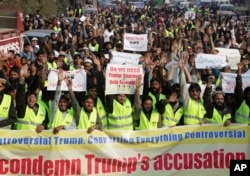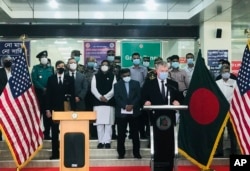As President Donald Trump's second term gets underway, the contours of his administration's South Asia policy are taking shape: India stands front and center, while other regional countries like Bangladesh and Pakistan prepare to be sidelined.
"With the exception of India, which is a large but special case, the other countries in South Asia, I think, are positioning themselves for somewhat less attention from Washington, somewhat less predictability, and somewhat more bilateral engagement operating through multilateral organizations or multilateral channels," said Joshua White, a former director for South Asian Affairs at the National Security Council who is now a professor at Johns Hopkins SAIS.
India
The Trump administration's regional priorities were on full display at the president's inauguration Monday. While Bangladesh and Pakistan were relegated to sending their ambassadors to the event, India's foreign minister, S. Jaishankar, got a coveted front-row seat.
"It was very clear the Trump administration was keen to have India present at the inauguration," Jaishankar said at a Wednesday news conference. "They're clearly prioritizing the bilateral relationship."
While the Biden administration worked closely with India on a range of issues, including defense and technology, Indian officials see Trump's return to office as an opportunity for expanded cooperation. Trump and Indian Prime Minister Narendra Modi's warm relationship, forged during Trump's first term, promises a deeper partnership, officials and experts say.
In October, Trump called Modi "a great friend" and "the nicest human being." Modi reciprocated in his congratulatory message, calling Trump a "dear friend" and pledging to work "closely together once again."
Beyond the rapport the two leaders share, India, South Asia's largest country, is a strategic U.S. ally and a counterweight to China's expanding influence in Asia. The U.S. is also India's second-largest trading partner after China.
Secretary of State Marco Rubio and national security adviser, Mike Waltz, both China hawks and staunch India proponents, are expected to push for deeper bilateral engagement with New Delhi.
Underlying India's importance, Rubio had his first bilateral meeting with Jaishankar.
"There was a very visible appetite to get this relationship moving, to do more, to raise the bar, to set bigger goals," Jaishankar said.
An early focus in the U.S.-India relationship: mass deportation of undocumented Indian immigrants.
India has identified 18,000 undocumented Indian migrants for repatriation to India, Bloomberg news reported this week, showing support for a Trump administration priority.
There are nearly 800,000 undocumented Indians living in the U.S., including tens of thousands who illegally entered the country under the Biden administration.
Jaishankar said India is opposed to illegal migration and open to the return of illegal migrants.
Yet challenges remain in the relationship. Visa delays experienced by Indian citizens "constrain the people-to-people interactions," he said.
Moreover, the Trump administration's pivot to other geopolitical issues, from the war in Ukraine to the relationship with China, could overshadow relations with India, experts say.
"If they have anything significant to be anxious about, apart from the immigration questions, it will be that this administration will not be as attentive to South Asia as the last administration was," White said.
Pakistan
Pakistani Prime Minister Shehbaz Sharif used an optimistic tone on Trump's inauguration day, pledging to work with the new president to strengthen the U.S.- Pakistan relationship.
"Over the years, our two great countries have worked together closely to pursue peace and prosperity in the region and beyond for our peoples & we shall continue to do so in the future," Sharif wrote on X Monday.
To engage with the new administration, Islamabad dispatched Interior Minister Mohsin Naqvi to Washington to meet with members of Trump's foreign policy team as well as congressional leaders, a leading Pakistani newspaper called Dawn, reported Friday.
Yet U.S.-Pakistan ties remain strained. Early in his first term, Trump suspended most security aid to Pakistan, accusing it of harboring terrorism, before gradually resuming cooperation as his administration began to negotiate an agreement with Afghanistan's Taliban.
Complicating the prospects for improved ties between Washington and Islamabad, Pakistan's former Prime Minister Imran Khan remains in prison, with many members of Congress and some Trump advisers calling for his release.
Alluding to those calls, a Pakistani foreign office spokesperson cautioned Thursday against interference in Pakistan's internal affairs, even as he reiterated hopes for expanded bilateral ties.
"This is part of the principles on which interstate relations are shaped," the spokesperson, Shafqat Ali Khan, said, according to Dawn.
Zamir Akram, a former Pakistan ambassador, noted that Washington tends to view Islamabad through its strategic alliance with China and tensions with India.
"So, this is a difficult environment that we'll face," Akram said on a podcast hosted by the Islamabad Policy Research Institute.
Bangladesh
Bangladesh presents another complex case in the Trump administration's approach to South Asia.
Following Prime Minister Sheikh Hasina's ouster last August, the interim government led by Nobel laureate Muhammad Yunus received a wide range of support from the Biden administration.
That support is now on the chopping block. Yunus, who has been critical of Trump in the past, nonetheless voiced cautious optimism about bilateral cooperation with the new U.S. administration.
In his congratulatory message to Trump, Yunus "expressed firm belief that both nations would work together to explore new avenues of cooperation," according to the Bangladesh foreign ministry.
The country's two leading parties — the Bangladesh Nationalist Party and the Awami League — urged continued U.S. support for Bangladeshi democracy and development.
"As a democratic country, I expect America and other democratic nations to support and cooperate in favor of democracy," BNP Secretary General Mirza Fakhrul Islam Alamgir told VOA. "I believe the United States will assist in fostering democracy and development in our country."
But Mohammad A. Arafat, a member of the Awami League's central executive committee and a former state minister, criticizing the Biden administration's policy, urged a course correction.
"Unlike the Biden administration, which showed unwavering support for individuals like Dr. Yunus despite allegations of corruption, the Trump administration adopts a non-interventionist approach, refraining from interfering in other countries' internal affairs," Arafat told VOA.
VOA's Bangla Service contributed to this report.







